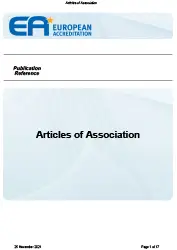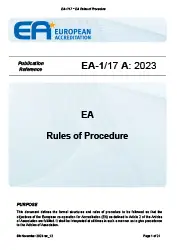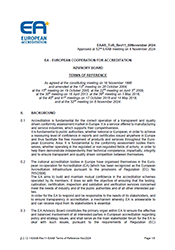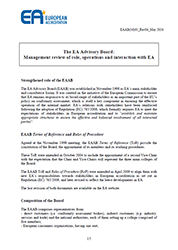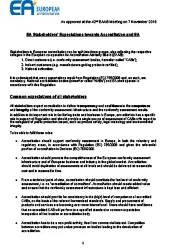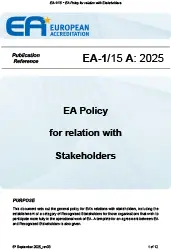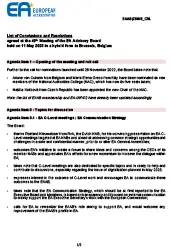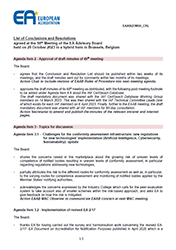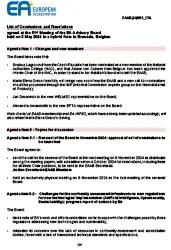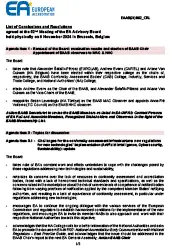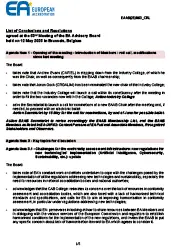EA Structure
- The General Assembly is the association’s highest decision-making body;
- The Executive Board is responsible for implementing EA governance and financial policies, and managing the organisation (including financial management) between the meetings of the General Assembly and as directed by the General Assembly;
- The Advisory Board is EA’s main forum for relations with stakeholders;
- The Technical Management Board (TMB) is responsible for coordinating the technical activities of EA;
- EA Management
EA Management
General Assembly (EA GA)
The General Assembly, the association’s highest decision-making body, supervises EA management and the general course of affairs in the association and takes decisions on strategy and general policies. The General Assembly creates and dissolves EA Technical Committees, MAC, and Networks. It also elects the President, Vice President of EA, the Executive Board, as well as the Technical Management Board.
For further details, read:
Executive Board
The Executive Board is responsible for implementing EA governance and financial policies, and managing the organisation (including financial management) between the meetings of the General Assembly and as directed by the General Assembly.
Members of the Executive Board
(2025-2026)

EA President

Vice-President



Technical Management Board
The Technical Management Board (TMB) is responsible for coordinating the technical activities of EA.
Members of the Technical Management Board
(2025-2026)

EA Vice-President
TMB Chair

Laboratory Committee Chair (LC)

Horizontal Harmonization
Committee Chair (HHC)

Multilateral Agreement
Council Chair (MAC)

Certification Committee
Chair (CC)

Inspection Committee
Chair (IC)
Committees
committee
(RvA, The Netherlands)
Scope: accreditation of Conformity Assessment Bodies performing certification, validation and verification activities.
Chair: Kristina Hallman
(SWEDAC, Sweden)
Scope: harmonised implementation of Regulation (EC) No 765/2008, EN ISO/IEC 17011 Conformity assessment — Requirements for National Accreditation Bodies (NAB) accrediting Conformity Assessment Bodies, and relevant ILAC/IAF and EA application documents.
Chair: Marek Wilgos
(PCA, Poland)
Scope: accreditation of Conformity Assessment Bodies performing inspection activities.
Chair: Sergio Guzzi
(ACCREDIA, Italy)
Scope: accreditation of laboratories, proficiency testing providers and reference material producers.
Chair: Maria Papatzikou
(ESYD, Greece)
Scope: management and monitoring of the peerevaluation process, decision on Multilateral Agreement (MLA)/ Bilateral Agreement (BLA) signatories and evaluators’ training and monitoring.
EA Advisory Board (EAAB)
The EA Advisory Board (EAAB) is the main forum for relations with stakeholders and advises EA on a broad range of political and strategic issues. The EAAB is represented in the EA Multilateral Agreement Council.
The Board’s composition constitutes a well-balanced representation of the parties which rely on and contribute to the European accreditation system, with representatives from:
- the conformity assessment community;
- the industry, services and trade;
- the EU Member States’ national authorities;
- European private scheme owners;
- the consumer associations;
- the European metrological institutions;
- the European standardisation organisations;
- the European Commission;
- and the European Free Trade Association (EFTA).
Discussions focus on issues relating to harmonization, strategy, and policy on accreditation. In particular, the EAAB supports EA to ensure that accreditation in conformity assessment activities is applied with openness and transparency.
It also monitors EA developments to promote an accreditation process leading
to quality and competence-driven competition between accredited Conformity Assessment Bodies and coherence with international accreditation practice.
Reference documents:
General policies:
Meetings:


